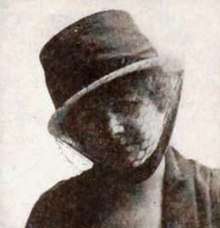Lois Zellner
Lois Zellner (January 24, 1883 – ???) was an American screenwriter active during Hollywood's silent era.[1] She also went by the name Lois Leeson later in her career.
Lois Zellner | |
|---|---|
 Exhibitors Herald, May 1, 1920 | |
| Born | Lois Grier January 24, 1883 Macon, Georgia, USA |
| Died | Unknown |
| Other names | Lois Leeson |
| Occupation | Screenwriter |
| Years active | 1916–1935 |
| Spouse(s) | John Wyncoup Murray (div.) Arthur J. Zellner (div.) |
Biography
Beginnings
Born Lois Grier to Clark Grier and Minnie Walthour,[2] Zellner was raised in Macon, Georgia, where she met and married her first husband, William Wyncoup Murray Sr., in 1899 at age 15. The pair had three children before divorcing around 1911. Zellner moved to New York and got into advertising before finding her way as a journalist and writing scenarios on the side, pitching them but struggling to sell them.[3]
Hollywood career
In 1913, she married Arthur J. Zellner, future studio publicity man, in New York. The two would collaborate on a number of plays together before taking their savings and moving to Hollywood.[4][3] The first script Lois sold was 1916's The Innocent Lie (Famous Players-Lasky).[5] From 1916 through 1926, Lois worked steadily, writing scripts and scenarios for directors like Sidney Olcott and Victor Schertzinger.
In 1921, she and Arthur Zellner divorced; a friend of hers testified that Lois had always been the breadwinner, and that it caused contention in the marriage.[6] A few years after their marriage ended—around the time she signed a contract to work with Edwin Carewe at First National—she began going by the name Lois Leeson professionally.[7][8] She and Carewe worked on a number of films together in the 1920s. In 1928, her script from The Woman from Hell was made into a stage play performed at the Hollywood Playhouse before being turned into a 1929 film of the same name.[9]
Little is known about what became of her after 1935, when her script for Busby Berkeley's Bright Lights was acclaimed.
Personal life
Lois was married twice: First to Murray, and second to Zellner. Two of her sons with Murray forged careers for themselves in Hollywood: Clark Murray became an assistant director and a publicity man, and Jack Murray became a well-known editor.
Selected filmography
- Bright Lights (1935)
- The Woman from Hell (1929)
- Molly and Me (1929)
- Pals First (1926)
- High Steppers (1926)
- Law or Loyalty (1926) (adaptation)
- Joanna (1925)
- Why Women Love (1925)
- The Lady Who Lied (1925)
- Drusilla with a Million (1925) (scenario)
- Speed (1925) (adaptation)
- Flaming Love (1925)
- The Family Secret (1924) (scenario)
- The Foolish Virgin (1924)
- The Law Forbids (1924)
- The Whispered Name (1924)
- Bag and Baggage (1923)
- The Man Between (1923)
- The Scarlet Lily (1923)
- The Lonely Road (1923) (adaptation)
- Her Accidental Husband (1923)
- Refuge (1923)
- White Shoulders (1922) (adaptation)
- Rich Men's Wives (1922) (scenario)
- Should a Wife Work? (1922)
- Fine Feathers (1921)
- Payment Guaranteed (1921)
- The Misleading Lady (1920) (scenario)
- The Gamesters (1920) (story)
- Someone in the House (1920) (scenario)
- The Misfit Wife (1920) (scenario)
- The Cheater (1920)
- The Dangerous Talent (1920)
- Eve in Exile (1919) (scenario)
- Turning the Tables (1919) (scenario)
- Nobody Home (1919) (scenario)
- Bill Henry (1919) (scenario)
- Happy Though Married (1919) (scenario)
- His Bonded Wife (1918) (story)
- The Silent Woman (1918) (story)
- Money Mad (1918) (scenario)
- The Girl from Bohemia (1918) (story)
- Friend Husband (1918) (story)
- A Mother's Secret (1918) (story)
- Over the Hill (1917)
- Giving Becky a Chance (1917) (story)
- As Men Love (1917) (story)
- The Little Brother (1917) (story)
- The Innocent Lie (1916) (scenario)
References
- Koszarski, Richard (2008). Hollywood on the Hudson: Film and Television in New York from Griffith to Sarnoff. Rutgers University Press. ISBN 9780813542935.
- "19 Oct 1919, Page 55 - Oakland Tribune at Newspapers.com". Newspapers.com. Retrieved 2018-12-31.
- "Reade's Strand". The Courier-News. July 2, 1929. Retrieved January 17, 2019.
- Gmür, Leonhard (2013-11-14). Rex Ingram: Hollywood's Rebel of the Silver Screen. epubli. ISBN 9783844246018.
- "4 May 1916, Page 2 - El Paso Herald at Newspapers.com". Newspapers.com. Retrieved 2018-12-31.
- "Sobs Story of Deadly Politeness". The Los Angeles Times. December 7, 1921. Retrieved January 15, 2019.
- "News from Hollywood in Brief Measure". The Philadelphia Inquirer. May 6, 1928. Retrieved January 17, 2019.
- "Lois Leeson to Adapt Stories for Carewe". The Los Angeles Times. June 25, 1925. Retrieved January 17, 2019.
- "First Stories Winners". The Los Angeles Times. May 6, 1928. Retrieved January 17, 2019.